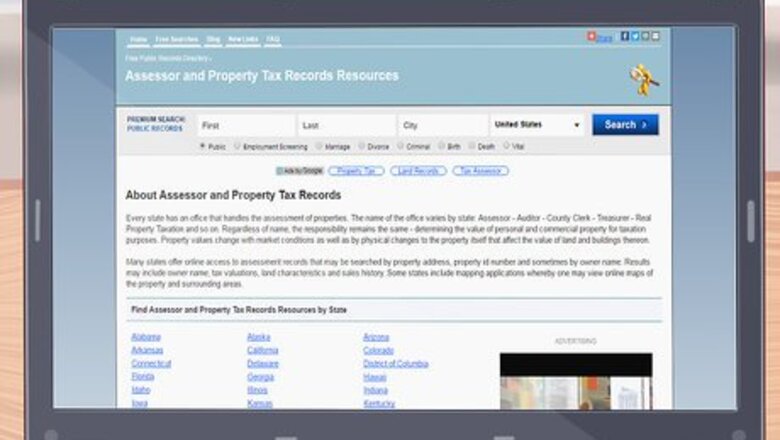
views
Identifying the Property and Locating the Deeds
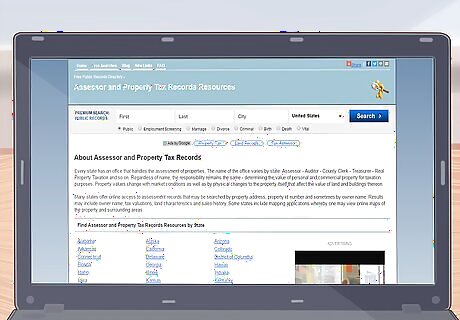
Check the tax assessor’s records. You need to gather as much information as you can about the current property owner and the property itself. You do this so that you can more easily locate the current and past deeds for the property in which you are interested. Most property tax records can be located at the tax assessor’s office in the county or city in which the property is located. These records are open to the public and many places have their records online. You must have the street address for the property in which you are interested. You can locate the tax assessor’s office for your area at: https://www.publicrecords.onlinesearches.com/Assessor-and-Property-Tax-Records.htm. Once you have identified the local tax assessor’s office, check their website to see whether you can search online for tax information for the property. If they do not have an online search option, call the office and ask them to explain the steps you must take to obtain this tax information for the property. The property tax records will provide you with the following information: the parcel number, lot number, a general description, and the tax history, both paid and unpaid of the property. This information will assist your deed search.
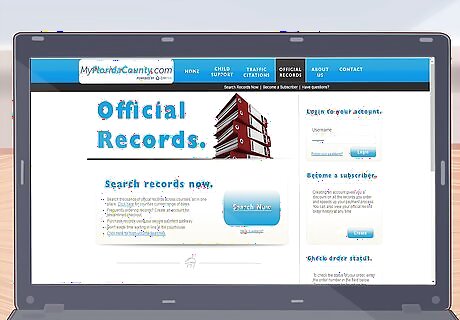
Search for the property deed online. Many states now provide access to deeds online, for either a small fee or for free. This is the fastest way to begin locating deeds for the property and conducting your title search. You want to locate the most recent deed first. This deed will contain the name of the owner of the property, which should match the name of the person from whom you are purchasing the property. Each deed will reference other previous deeds and maps of the property location and any liens. You want to gather deeds for the previous 50 to 70 years to ensure that the title of the property has passed correctly. This is called the chain of title and will be discussed in more detail below. You should gather all of the deeds available online. If the online system does not maintain deeds for that many years, you will have to do in-person search (discussed below). You can conduct an internet search for the words “land records” and the name of your state and this should direct you to any online system or local title plant. To see what online land record system looks like you can visit: https://www.masslandrecords.com or https://www.myfloridacounty.com/official_records/index.html?thisPage=MyFloridaCounty.ORI.Order.state.Start.
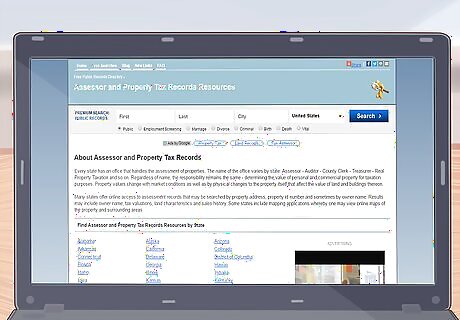
Visit the office that records deeds. If the county where the property is located does not have an online deed search system or it does not go back far enough in the past, you will need to locate and visit the office responsible for recording deeds for the area where the property is located. In order to conduct a successful search, you must bring copies of all of the deeds that you located and/or the information that you obtained at the tax assessor’s office. You can search for the deed recorder’s offices at: https://publicrecords.onlinesearches.com/Assessor-and-Property-Tax-Records.htm. Once you have located the correct office, contact the office and ask the best way to proceed with your search. The courthouse or office workers will be able to tell you whether you have gathered enough information to conduct your search. You will locate the most recent deed first. Most offices maintain this information in a deed book. You should check whether the information gathered at the tax assessor’s office directs you to a specific deed book. If so, that is where you will find the most recent deed. Each deed will contain information about the previous deed, which will allow you to locate that document. This information will include the deed book number and the page number within the book where the previous deed is located. You should continue pulling and copying all of the deeds until you have gathered deeds covering 50 to 70 years. This can be a very time consuming process but you can locate all of the information that you need.

Establish chain of title. Once you have gathered all of the deeds, you want to start with the most recent and move backwards in time to check that ownership passed properly. This means that a person who bought a property is listed as the seller when the property changes ownership. You should create a chart that contains the following columns: Deed, Seller, and Buyer. Starting with the most recent deed, you want to make sure that the seller was the buyer on the previous deed. You want this pattern of seller/buyer to continue uninterrupted from the present back 50 to 70 years. By filling this information in on a chart, you can more easily see if there are any gaps in ownership, which could effect the current property owner’s ability to lawfully sell you the property. For example, if you come upon a seller on a deed whose name was not listed as a previous buyer, there is a break in the chain of title. It may be that the title was not properly recorded or that a person fraudulently passed himself or herself off as an owner to an unwitting seller. Before purchasing a property with a break in the chain of title, you should speak with a real estate attorney to determine the risks associated with the purchase.
Checking for Liens, Mortgages, Judgments, or Outstanding Taxes

Conduct a tax search. As discussed above, you can search the tax assessor’s records to locate information on the current owner of a property and the location of the recorded deed. These same records will also indicate whether there are any outstanding taxes on the property or special assessments on the land. As a part of the title search, you want to make sure that the property is not subject to any liens before purchasing the property. Outstanding taxes are liens against the property and could transfer to the new owner. If the past due taxes are significant, the county or state may be able to place the property up for sale even though the new owner was not responsible for accruing the debt.

Determine whether there is a judgment lien against the property. Another important part of the title search is to determine whether there are any unsatisfied judgments against the seller or previous owners of the property. A judgment is a lien against a person’s property and the property acts as collateral for any money owed until the judgment is satisfied. If a judgment is discovered, this is considered a defect in the title and the seller should eliminate the defect before it can be passed to a new buyer free and clear. Generally, a buyer who is seeking financing will not be able to secure financing for a property with a judgment lien. If you discover a judgment lien prior to purchasing the property, ask the seller to contact the creditor of the lien and determine how to rectify the judgment, either by paying it off or if the lien was already paid, ask for a satisfaction of lien. This document shows that the debt has been discharged and can be used to remove the lien from the title. Most states have laws prohibiting an owner from selling a property with a judgment lien. You should be able to determine whether there is a judgment lien against the property in the same place that you located the deeds, for example the Registrar of Deeds or Clerk of Court. You should contact the Registrar of Deeds or whichever office records deeds in the county where the property is located and ask the best way to search for any judgment liens against the property.

Discuss any financial restrictions with a real estate attorney. There are any number of financial restrictions that can be placed against a property, such as: outstanding mortgages, liens, judgment, or unpaid taxes. All of these restrictions can significantly reduce the value of the property. You also run the risk of losing your property to someone who has another legal interest in the property. Since not all states restrict the sale of property with financial restrictions, you must not only conduct a thorough title search, you should also discuss any financial restrictions that you discover on the property with a real estate attorney before you purchase the property. If a seller determines that a lien on the property is invalid, he or she should contact an attorney to have the lien vacated by a judge. It is not the responsibility of a buyer to rectify any liens on the property. However, a buyer should not purchase a property that has a judgment lien. If the seller is unable to satisfy a judgment lien and a buyer really wants the property, the buyer should discuss with an attorney whether it would be feasible for the buyer to payoff the lien and in exchange the seller would reduce the amount of the cost of the property by the amount of the lien. If a seller is purchasing a foreclosure home with a judgment lien, generally, if the house is purchased through a sheriff’s sale or auction, the title passes to the seller free and clear of any liens. A person purchasing a foreclosure home with a lien should consult an attorney to determine whether the home, if purchased, would pass with a clear title. If a buyer purchased a property for cash and did not discover the judgment lien prior to the transfer of title, the buyer should contact an attorney to determine if there are steps that he or she can take to force the seller to pay off the lien.
Hiring a Title Search Company
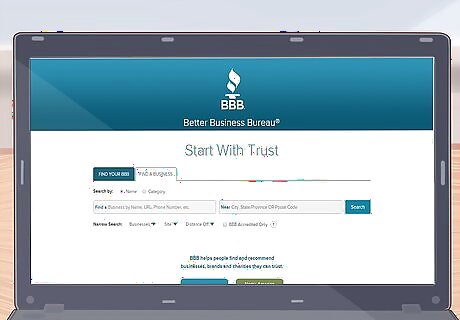
Ask for a recommendation. While you can conduct a title search on your own, you should still consider hiring a title search company to conduct the search on your behalf, especially if you are making a significant financial investment. You should ask your real estate agent, family, friends or anyone that you know who has recently purchased property for a recommendation on a title search company. When evaluating a title search company, consider the following: How many years of experience does the company have? You want a company that has completed numerous title searches and is familiar with the records where the property is located. Check the Better Business Bureau to see whether any complaints have been filed against a potential company. You can search for complaints at: https://www.bbb.org. Compare the prices between several experienced title search companies in your area to make sure that you are getting the best deal.

Choose a title search company with which you are comfortable. You may need to meet with or speak with your title search company throughout the purchase of the property. You should meet with or speak to an agent from the title search company before you decide to hire them. This lets you decide whether you feel comfortable with the company, whether they seem responsive to your questions and how accessible they are to you. In some states, people are represented at their real estate closing by an agent from the title company. You have the right to contact your title search company throughout the process. You should ask questions about how they conduct their title searchers, including whether they rely on online databases only. Ask them to explain their report and abstracts. If the title company is going to handle the closing on your property, ask them to explain the process, go over all paperwork and explain how any funds that you provide for the purchase of the home will be held in escrow.

Consider purchasing title insurance. While at first glance, spending $1000 on title insurance may seem like an unnecessary cost, you should seriously consider paying for the insurance. Title insurance protects you against many of the issues that were discussed above. For example, if a person sells you a home that she or he does not own or co-owns the property, the insurance will protect you from losing your financial investment. Generally, your closing agent or attorney will help you choose and acquire the title insurance. In some states, the seller pays the cost of the insurance. Typically, you pay for the insurance with a one time fee that is around $1000.




















Comments
0 comment